Knowledge of prostate cancer and its screening among males attending Urology OPD in a tertiary care hospital in Kathmandu
DOI:
https://doi.org/10.3126/nmcj.v25i3.58722Keywords:
Prostate cancer, screening, questionnaire, serum prostatic specific antigenAbstract
Prostate cancer is a global burden on public health and it has been ranked as the second most common cancer in males worldwide. The incidence of prostate cancer generally increases with age and men with family history of prostate cancer have an increased risk of getting prostate cancer. The incidence varies across the world, where developed countries have a higher incidence as compared to developing countries. It is well known that early detection of certain grades of prostate cancer leads to a higher remission rate. Starting the screening for prostate cancer at the age of 40 for specific population provides the only way to reduce mortality from prostate cancer. A cross sectional hospital study was conducted using Consecutive sampling of eligible patients in the Urology Outpatient Department (OPD) of a tertiary care hospital in Kathmandu. A total of 378 patients attending Urology OPD were included in the study. A structured questionnaire which was sectioned into sociodemographic characteristics, knowledge of prostate cancer and its screening practices was administered to all the participants. Male more than 60 years of age attending Urology OPD were more (33.3%) followed by age group less than 40 years of age (28.6%). The majority of the patients visiting Urology UPD were from Province 3 (73.0%) and Province 1 (11.1%). Most of these patients were literate (34.9%) but the education level of college or higher were less (17.7%). When knowledge of prostate cancer among the participants were assessed, 55.6% participants replied that they have heard about the prostate cancer and among them, the majority of the participants (28.6%) had heard it from media like TV, radio and internet. The most common symptoms chosen by patients were hematuria (80.2%) and weight loss (72.0%). When asked about the prevention and cure of prostate cancer, 61.1% and 78.6% of them did not know about the prevention and its cure respectively. When knowledge on screening of prostate cancer was assessed, more than half of the participants were found to be aware of screening test and among them 94.4% chose blood test, Serum Prostate Specific Antigen (PSA) as the screening test. Majority of the patients (61.4%) had chosen the age for screening as <40 years and many more (91.3%) wanted to go for screening. Overall, 55.6% had heard about prostate cancer and 30.7% did not know any symptoms of prostate cancer. This study identifies some deficits in knowledge of prostate cancer and screening among participants which can be addressed to increase the knowledge related to prostate cancer. It is thus important that these participants and other men be educated more on these important domains of prostate cancer.
Downloads
Downloads
Published
How to Cite
Issue
Section
License
Copyright (c) 2023 Nepal Medical College Journal

This work is licensed under a Creative Commons Attribution 4.0 International License.
This license enables reusers to distribute, remix, adapt, and build upon the material in any medium or format, so long as attribution is given to the creator. The license allows for commercial use.




